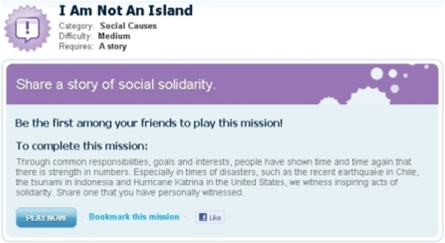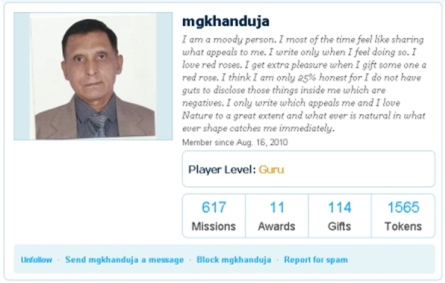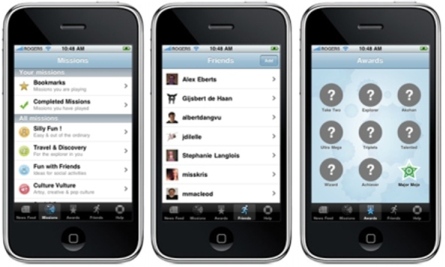[As first posted on Henry Jenkins blog, and previously on the Civic Paths blog]
How can we make everyday civic participation more compelling? There is a new kind of game on the horizon, one that experiments with real-world action. I call these “direct action games,” because they restructure acts like volunteering, activist training, and charitable giving. One prototype is Akoha, which started as a card game, then reinvented itself online, and last year launched a mobile app — largely off the radar of traditional civics organizations.
At first glance, Akoha looks like a media hub for some do-it-yourself Boy Scouts. Their website reveals thousands of participants, many reporting success with real-world “missions,” from going vegetarian for a day, to debating the “I Have a Dream” speech. The actual missions often take place offline, but are only rewarded if documented with photos and stories posted online or via iPhone.
I think Akoha deserves real attention as a working example — despite some prominent flaws. We desperately need concrete projects if we want to actually rethink civic life. The use of games to help “fix reality” has been a hot topic these past few weeks, thanks to the great traction of Jane McGonigal’s new book. Yet the missions of Akoha are more straightforward than most of Jane’s “alternate reality games,” which tend to have futuristic narratives, puppet masters behind the scenes, and a preference for crowd-sourcing. Thus I propose we look to Akoha and its more raw building blocks to think about direct action games.
Participants in Akoha are mostly adults, but the ages vary widely. The experience is deeply social, as friends create missions for each other, and share their stories. More formal recognition for participation comes as players earn badge-like awards — such as “multi-talented” for those who complete one mission in every possible category.
Most of Akoha does not look or sound civic. Only one of the mission categories explicitly addresses “social causes.” The other nine concern self-actualization in various forms, from “health and well-being” to family time, engaging with popular culture, and the discovery of travel. Is this breadth an upside or downside? That depends on your civic goals, which might include:
1. Fostering citizen journalism, as participants report on civic themes in their communities
2. Informal civic learning, as participants reflect on their civic experiences in new ways through stories and pictures
3. Building social capital, as participants create new ties across traditional social groups
These civic goals may be structurally possible with Akoha, but they are rhetorically hidden. Even as Akoha’s missions bring people into the real world, they avoid the “we are purely civic” framing that occurs on many activist and volunteering websites. For the Akoha community, it’s OK to admit that you are mainly there to have fun, or are trying to improve yourself (and not simply sacrificing for others). Consider this screenshot from the social cause mission “I Am Not an Island”:

Participation begins with the usual click of a button, yet the specific language of “Play Now” differs sharply from the tool focus of civic action websites (e.g., “Take Action Now;” or “Sign the Petition”). But what exactly does it mean to ‘play’ Akoha? Is it a game?
Certainly Akoha is recreational, and like all games, there are rules. In particular, participants must describe what they did to complete a mission, and thus must certify that they have met the terms set forth by the original mission author. Points and profiles track progress across the Akoha system. All players’ profiles feature their picture, personal statement, and a quantitative scoreboard — including their “player level,” number of missions completed, and awards. For a sense of what this looks like, here is one particularly high-achieving player, chosen from among the more than 10,000-plus who have registered:

This public profile has evolved much as the community has coalesced. Just a few months prior, the player described himself in much more formal terms, emphasizing his offline profession — a “freelance Air conditioning and Refrigeration engineer by qualification and profession,” his belief in God, and how he found the site via Reader’s Digest. Now, in this recent screenshot, the player has removed his backstory, and describes instead how his Akoha playing strategy is driven by his personality. His refined self-presentation aligns with the pragmatics of the Akoha community, which focuses on choosing missions and writing stories — both depending more on personality than professional accomplishments outside the community.
Akoha is a designed system, and so I recently interviewed Alex Eberts, co-founder of Akoha and an influential force behind its design. He spoke of his desire to find “psychological drivers that are common to the real-world, and to game play.” His designs were informed by self-determination theory, which Eberts first came across in a session at the Game Developers Conference. (Academics, pay heed – these are not the usual dissemination channels for civic theory.)
Self-determination theory describes how human motivation is driven by basic human needs, including competence, autonomy, and relatedness. Altruism is not on the list of needs, just as it is not central to Akoha’s rhetoric. Pushing beyond traditional altruism in civic life is a theme that cuts across many of the projects we are tracking in Henry Jenkins’ Civic Paths research group — from the pop pleasure of Harry Potter, to the joy of diamonds as a precursor to political talk. Repositioning altruism is a battle, with fault lines between traditional civic organizations that have failed to engage youth, and new civic organizations that have failed to connect to politics. (See, for example, Bennett’s content analysis (pdf) of youth civic websites.)
Connecting games with the real-world necessitates a basic immediacy. This immediacy also distinguishes Akoha from most civic games, which focus on education for future civic life or future civic action. Here, the action and education are both in the present tense, which increases authenticity and the satisfaction of impact. The iPhone app for Akoha, released this past summer, underscores their immediacy — here is a set of screen shots they provide:

Using the mobile interface, Akoha missions can be documented on a bus in real-time, or browsed from a neighborhood park. Their mobile tech is fairly basic, consisting mainly of reskinning their existing website, with little use of GPS or other mobile sensor data. As a result, Akoha’s mobile interface is only minimally aware of the user’s location.
Place matters, especially in civics. (The neighborhood of our birth strongly predetermines a host of life opportunities, from income to education and governance.) This is an area for Akoha to grow. By improving their mobile support for place, its implications for civic activity would be more immediate and profound. In particular, Akoha might offer support for filtering missions for one’s own neighborhood, or connecting with players who are geographically nearby for joint missions, or simply allowing missions to release new clues when players arrive at specific locations.
Games are still discussed as individual indulgences. Yet increasingly, games are recognized as social forces. This is especially true for Akoha, where the social construction of value emerges over time, as a participant’s “friends” share stories about their missions and accomplishments. Different communities are likely to form over time. It is not yet clear whether Akoha is dominated by preexisting networks of offline friends, or by more interest-driven networks of people who gather around a shared passion. (This difference matters – see the ethnography of Ito et al.) Yet if Akoha can introduce strangers based on activity interests, the platform might transcend the left/right regression of civic talk that is so feared online by Sunstein.
Reimagining place is important civic work, just like the reimagining of societal values, tax policy, and even collective heroes. The value of games is to restructure this civic work around different rules – intrinsic motivations of the game, aligned with the desires of everyday people. Sometimes people want an excuse to be more civic. In my interview with Eberts, he confessed that one of the big surprises for his team was how much everyday people wanted Akoha to be even more civic. He hinted that future Akoha versions might well expand toward the civic.
Even as mobile has reshaped the everyday experiences of place and time, so too we may see game-like activities begin to restructure the experience of public participation. Yet Akoha remains an “edge phenomenon” to both the civic and gaming communities. In the first case, nonprofits are still trying to understand games for training, let alone for direct action; in the second, the independent gaming community is struggling to understand games for art, let alone games that improve the real world. Akoha is likely to be seen as a risky investment for funders in either community. Thus the evolving Akoha business model may be as crucial as its innovations in civic participation. For example, Eberts hints that corporate engagement may be an area of growth for such games.
Beyond Akoha, it might be useful to define a framework for direct action games. In a panel I organized last year at the Games for Change Festival, we explored the concept, and its historic manifestations; fellow panelists were game designer Tracy Fullerton and activist/scholar Stephen Duncombe (see embed below for video of the panel).
As we seek to define new templates for civic games, cases like Akoha help us prioritize research questions, including:
1. Can direct action games help us re-imagine civic activity under a different set of rules, solution frames, and feedback loops for engagement? (McGonigal’s aforementioned book nicely explores several of these philosophical questions.)
2. If only a portion of the activity is strictly civic, how do we compare to more traditional and pure civic engagement?
3. When is it appropriate to teach citizens how to “game the system” of democracy, to “win” in Akoha, or to rewrite the rules of local politics?
These issues will only become more important in coming months, as civic action goes digital and game culture grows. By examining cases like Akoha, we can develop frameworks for “direct action games” that better structure our civic designs.
